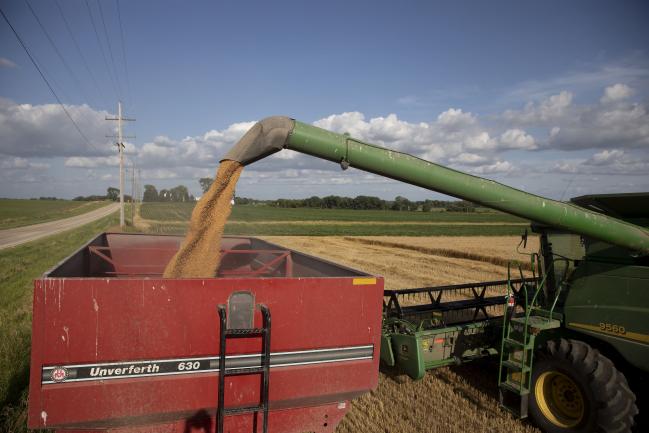(Bloomberg) -- Terms of Trade is a daily newsletter that untangles a world embroiled in trade wars. Sign up here.
The U.S. and Japan agreed in principle on a trade deal that would slash Tokyo’s tariffs on American beef, pork and other agricultural products, while delaying for now the threat of additional levies on Japanese auto exports to the U.S.
U.S. President Donald Trump and Japanese Prime Minister Shinzo Abe announced the agreement Sunday on the sidelines of the Group of Seven summit in Biarritz, France, following a bilateral meeting earlier in the day. In announcing the deal, Trump also said Japan would purchase large quantities of U.S. wheat and corn.
“If you say ‘win-win,’ it’s a capital letter ‘Win’ for the U.S. and a small-letter ‘win’ for Japan,” said Ichiro Fujisaki, a former Japanese ambassador to the U.S. The deal would put the U.S. back in line with its rivals for Japan’s agricultural market in terms of tariffs, a position Washington would already enjoy had Trump not rejected an earlier multilateral trade deal.
“In Japan’s case, it’s a small win plus non-negative assurance that no unilateral measures will be taken by the U.S., like on limiting car importations or some relations with security issues,” Fujisaki said. While Japan kept the threat of tariffs at bay, it didn’t get a removal of existing auto tariffs in exchange for its farm concessions, nor a public promise not to impose higher car levies.
It was Trump’s threat of punitive tariffs on Japanese auto exports that spooked Abe into agreeing last September to start bilateral trade talks with the U.S. Trump has in turn come under pressure from U.S. farmers, reeling from the trade war with China, who have also been hobbled by the tariff disadvantage in the Japanese market compared with competitors from signatories of the Trans-Pacific Partnership regional trade deal he rejected.
“We’ve agreed in principle,” Trump said. “We’ve agreed to every point.” He also referred to a “massive” purchase of wheat and a “very, very large order of corn” that he said would happen quickly. Trump said there would be no change to U.S. tariffs on Japanese cars.
The countries have reached consensus on “core elements” and were aiming to sign a deal during United Nations meetings next month, Abe said. The prime minister said that agricultural product purchases were a possibility, adding that crop pests had resulted in the need for “emergency support” to enable the private sector to buy American corn.
“If we are to see the entry into force of this trade agreement, I’m quite sure that there will be the immense positive impact on both the Japanese as well as American economies,” Abe said.
While the proposed deal may provide Trump with a fillip as he heads into his re-election campaign facing rising tensions with China, the initial reaction in Japan was mixed. Some officials in Tokyo have said the country shouldn’t give up its leverage over U.S. farmers without substantial concessions, and Japanese trade agreements generally require parliament approval.
“As I expected, Japan gave ground on agriculture and didn’t win anything on autos,” former Japanese Prime Minister Yukio Hatoyama, an opponent of Abe’s long-ruling Liberal Democratic Party, said on Twitter. “This kind of obseqious diplomacy makes Abe happy, and hurts the people.”
Chief Cabinet Secretary Yoshihide Suga told reporters it wasn’t true that Japan had been “steamrollered” by the U.S and added that he didn’t think punitive so-called Section 232 tariffs would be applied to Japan.
Whether or not the threat has been removed is key to evaluating the deal, according to Junichi Sugawara, a senior research officer for Mizuho Research Institute Ltd. “Without knowing that, it’s too early to say whether this will be a good agreement for Japan,” Sugawara said.
U.S. Trade Representative Robert Lighthizer said the proposed deal would open markets to $7 billion of American products including ethanol, as well as beef, pork, dairy products and wine. He said tariffs on some Japanese industrial products would be reduced, but that these wouldn’t include cars. The proposed agreement also includes a clause on e-commerce, he said.
Level Field
The farming provisions of the deal won some early praise in the U.S., with the National Pork Producers Council and Senate Agriculture Committee Chairman Pat Roberts, of Kansas, among those welcoming a deal they said would put American agriculture on a level playing field with the 11 TPP-member nations.
Agriculture Secretary Sonny Perdue said removing the trade barriers would allow greater sales of U.S. farm products in Japan. Some in Japan said that was an acceptable price to pay.
“If we’re being realistic, the U.S. had been waving the 25% auto tariff card,” said Atsushi Takeda, chief economist at Itochu Research Institute Inc. “Japan’s managed to avoid that, there are probably no quotas, and for now there’s no comment on currencies. I think they’ve managed to end up with a passable result.”
(Adds comments from Japan’s Chief Cabinet Secretary in 10th paragraph)
